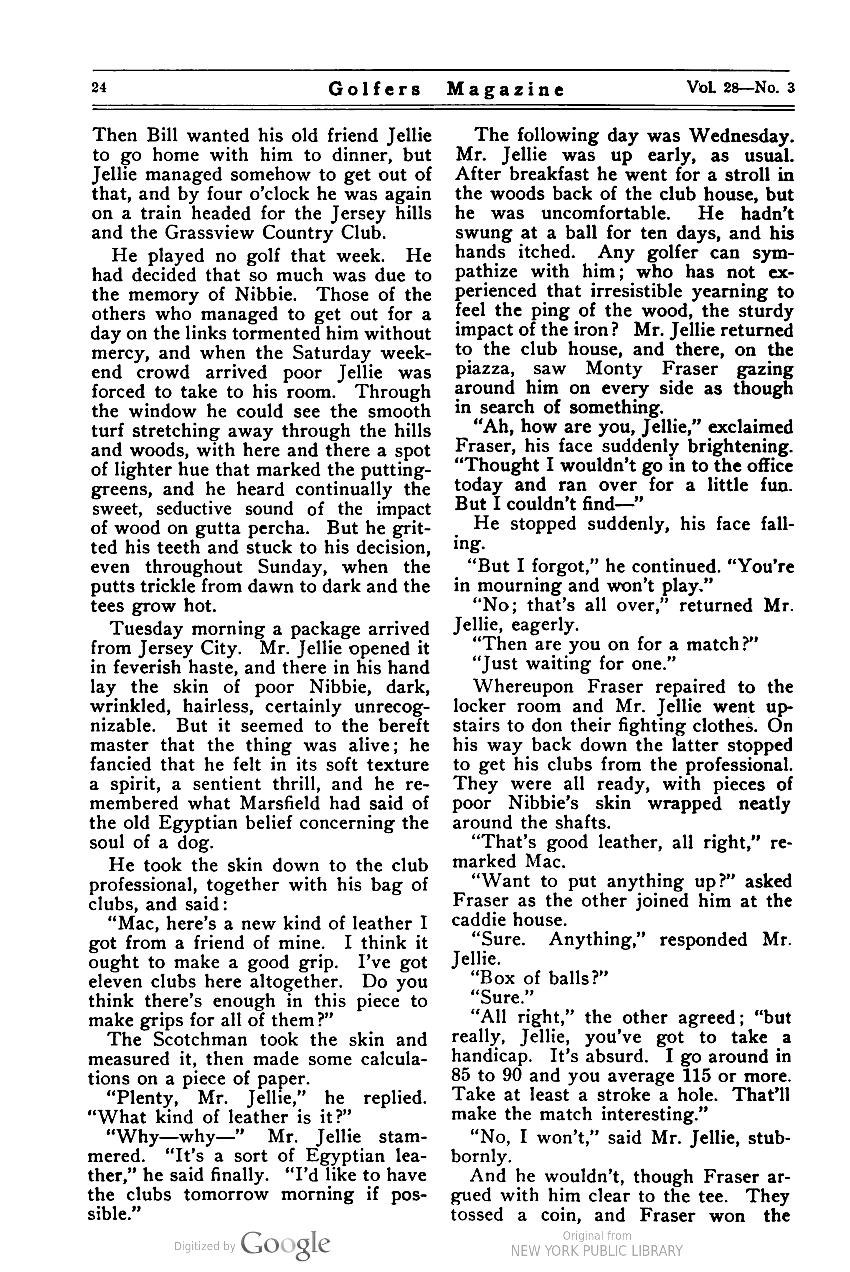Then Bill wanted his old friend Jellie to go home with him to dinner, but Jellie managed somehow to get out of that, and by four o’clock he was again on a train headed for the Jersey hills and the Grassview Country Club.
He played no golf that week. He had decided that so much was due to the memory of Nibbie. Those of the others who managed to get out for a day on the links tormented him without mercy, and when the Saturday weekend crowd arrived poor Jellie was forced to take to his room. Through the window he could see the smooth turf stretching away through the hills and woods, with here and there a spot of lighter hue that marked the putting-greens, and he heard continually the sweet, seductive sound of the impact of wood on gutta percha. But he gritted his teeth and stuck to his decision, even throughout Sunday, when the putts trickle from dawn to dark and the tees grow hot.
Tuesday morning a package arrived from Jersey City. Mr. Jellie opened it in feverish haste, and there in his hand lay the skin of poor Nibbie, dark, wrinkled, hairless, certainly unrecognizable. But it seemed to the bereft master that the thing was alive; he fancied that he felt in its soft texture a spirit, a sentient thrill, and he remembered what Marsfield had said of the old Egyptian belief concerning the soul of a dog.
He took the skin down to the club professional, together with his bag of clubs, and said:
“Mac, here’s a new kind of leather I got from a friend of mine. I think it ought to make a good grip. I’ve got eleven clubs here altogether. Do you think there’s enough in this piece to make grips for all of them?”
The Scotchman took the skin and measured it, then made some calculations on a piece of paper.
“Plenty, Mr. Jellie,” he replied. “What kind of leather is it?”
“Why—why—” Mr. Jellie stammered. “It’s a sort of Egyptian leather,” he said finally. “I’d like to have the clubs tomorrow morning if possible.”
The following day was Wednesday. Mr. Jellie was up early, as usual. After breakfast he went for a stroll in the woods back of the club house, but he was uncomfortable. He hadn't swung at a ball for ten days, and his hands itched. Any golfer can sympathize with him; who has not experienced that irresistible yearning to feel the ping of the wood, the sturdy impact of the iron? Mr. Jellie returned to the club house, and there, on the piazza, saw Monty Fraser gazing around him on every side as though in search of something.
“Ah, how are you, Jellie,” exclaimed Fraser, his face suddenly brightening. “Thought I wouldn’t go in to the office today and ran over for a little fun. But I couldn’t find—”
He stopped suddenly, his face falling.
“But I forgot,” he continued. “You're in mourning and won’t play.”
“No; that’s all over,” returned Mr. Jellie, eagerly.
“Then are you on for a match?”
“Just waiting for one.”
Whereupon Fraser repaired to the locker room and Mr. Jellie went up-stairs to don their fighting clothes. On his way back down the latter stopped to get his clubs from the professional. They were all ready, with pieces of poor Nibbie’s skin wrapped neatly around the shafts.
“That’s good leather, all right,” remarked Mac.
“Want to put anything up?” asked Fraser as the other joined him at the caddie house.
“Sure. Anything,” responded Mr. Jellie.
“Box of balls?”
“Sure.”
“All right,” the other agreed; “but really, Jellie, you’ve got to take a handicap. It’s absurd. I go around in 85 to 90 and you average 115 or more. Take at least a stroke a hole. That’ll make the match interesting.”
“No, I won’t,” said Mr. Jellie, stubbornly.
And he wouldn’t, though Fraser argued with him clear to the tee. They tossed a coin, and Fraser won the
